Crystal Meth Withdrawal: Symptoms, Timeline, and Treatment
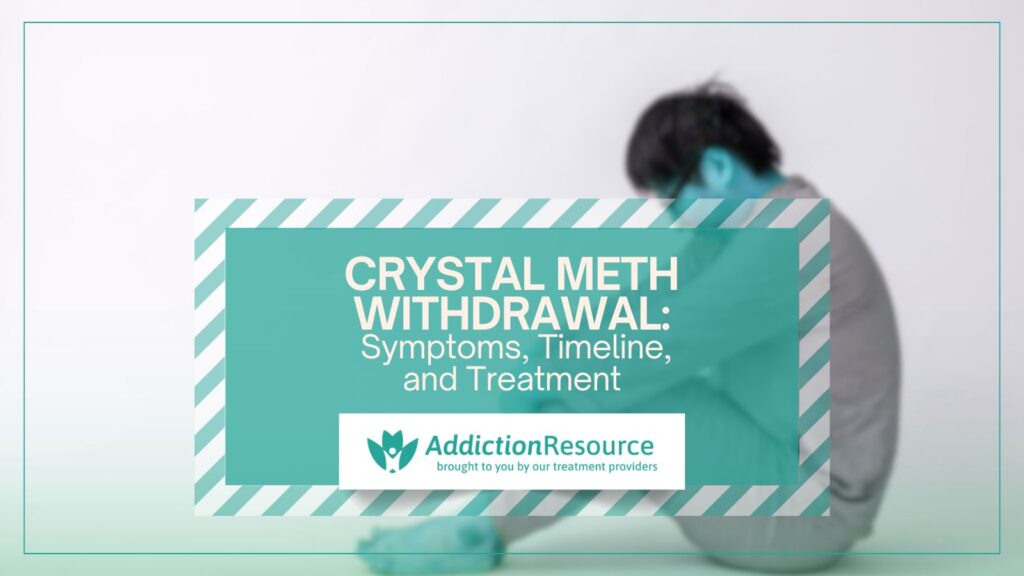
Crystal meth withdrawal is a condition that occurs when individuals with chronic drug use stop consuming meth. Crystal meth withdrawal happens because of physical and psychological dependence on meth for a long time, according to research titled “Best Practices: Managing Methamphetamine Withdrawal,” published in 2017 by Western University. Crystal meth is an illicit stimulant drug that increases the level of neurotransmitters (dopamine, serotonin, and norepinephrine) in the brain and affects the central nervous system.
The main crystal withdrawal symptoms are cravings, anxiety, mood swings, depression, trouble concentrating, memory loss, sleep disturbance, irritability, and pain. Crystal withdrawal symptoms start to appear when the effects of meth wear off.
Crystal meth withdrawal treatment options include medication management, detox programs, rehab programs, behavioral therapy, self-care, and contingency management. Individuals successfully recover from crystal meth withdrawal, if proper treatment is given under a doctor’s supervision.
Table Of Contents:
What is Crystal Meth Withdrawal?
Crystal meth withdrawal is when individuals stop taking meth after a continuous use. Crystal meth withdrawal symptoms are psychological and physical that affect the body and brain of individuals. Withdrawal symptoms are high in the first 2-3 days and last for almost a week, as shown in research titled “Methamphetamine” published by the National Institute on Drug Abuse. Crystal meth withdrawal symptoms depend on factors like administration method, duration of dose, frequency of dose, and health. Individuals experience withdrawal symptoms like anxiety, cravings, depression, fatigue, and mood swings when the effects of the drug wear off, according to a research titled “Management of Acute Withdrawal and Detoxification for Adults who Misuse Methamphetamine: A Review of the Clinical Evidence and Guidelines [Internet],” published in 2019 by PubMed.
What are the Symptoms of Crystal Meth Withdrawal?
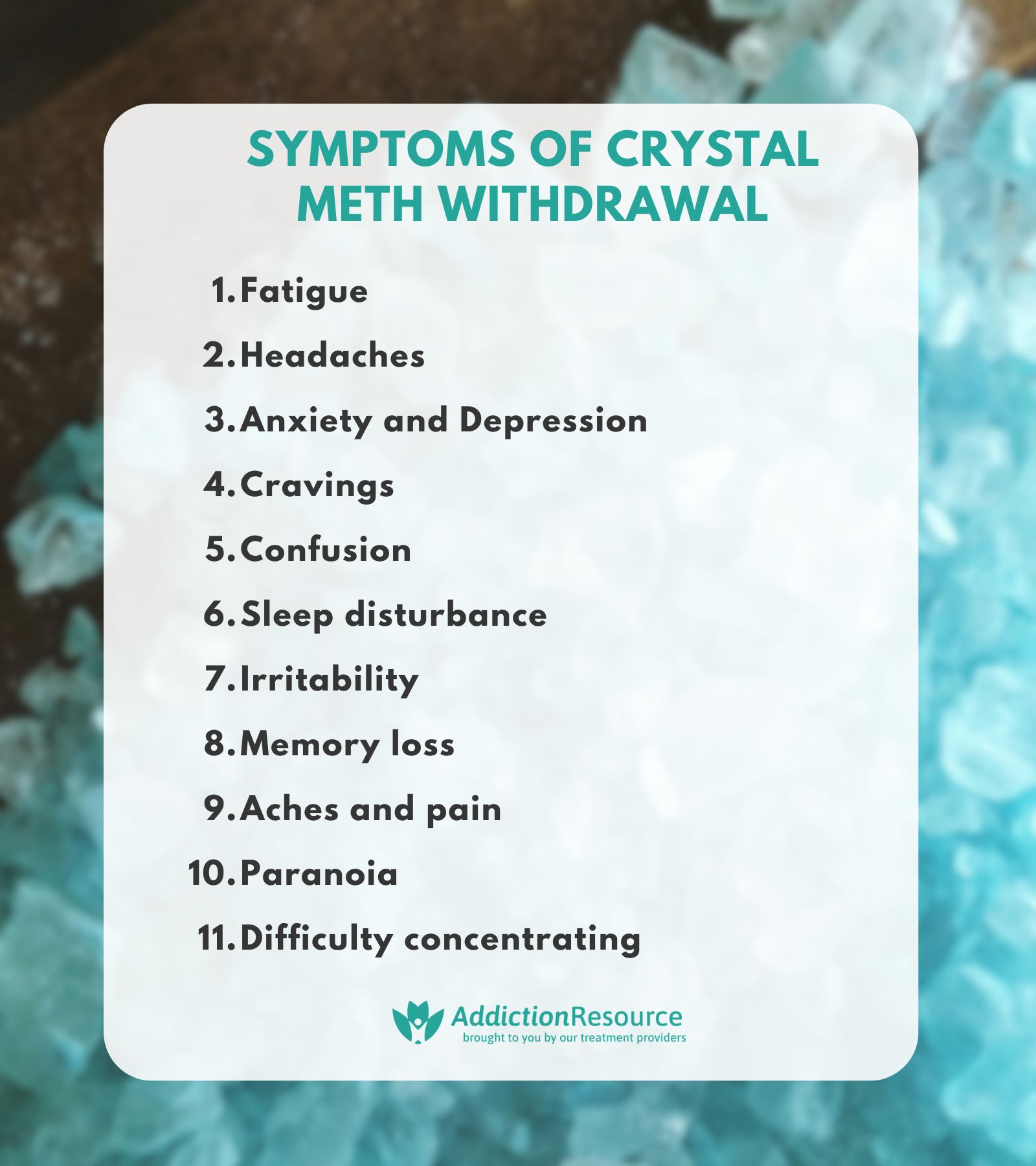
The symptoms of crystal meth withdrawal include fatigue, depression or anxiety, cravings, sleep disturbances, headaches, confusion, difficulty concentrating, memory loss, irritability, paranoia, aches, and pain.
The 11 symptoms of crystal meth withdrawal are listed below:
- Fatigue: Fatigue is a physical withdrawal symptom that occurs when individuals with chronic use do not consume crystal meth which leads to tiredness in the body. The dependency on drugs makes it difficult for individuals to feel normal without drugs during an initial recovery phase. Individuals experience intense fatigue for 12-24 hours after the effects of crystal meth wear off, according to a research titled “Pharmacological treatment for methamphetamine withdrawal: A systematic review and meta‐analysis of randomised controlled trials” published in 2022 by PubMed Central.
- Headaches: Crystal meth withdrawal leads to headaches because of extreme stress during the recovery process. Headaches are the short-term physical symptom of crystal withdrawal that occurs in the initial phase after the last drug use.
- Anxiety and Depression: Crystal meth releases a huge amount of dopamine in the brain that causes emotional instability which leads to anxiety and depression. Depression and anxiety are the psychological side effects of crystal meth withdrawal that appear during the first week and last for months or years in individuals with severe dependency, as shown in research titled “Anxiety level and correlates in methamphetamine-dependent patients during acute withdrawal” published in 2017 by the National Library of Medicine.
- Cravings: Cravings are one of the psychological withdrawal symptoms that occur when crystal meth effects wear off. Individuals desire to consume crystal meth makes it difficult for them to overcome meth addiction, according to a research titled “Effects of Length of Abstinence on Decision-Making and Craving in Methamphetamine Abusers” published in 2013 by PubMed Central.
- Confusion: Confusion is a psychological withdrawal symptom of crystal meth that occurs because of damage in the neurotransmitter system. Individuals find difficulty in decision-making, thinking properly, and processing information without taking drugs.
- Sleep disturbance: Sleep disturbances are the physical withdrawal symptom that occurs when the body tries to recover from prolonged crystal meth use, as shown in research titled “Methamphetamine and sleep impairments: neurobehavioral correlates and molecular mechanisms” published in 2021 by Oxford Academic. Individuals experience insomnia, disrupted sleep cycles, or hypersomnia because of dopamine and serotonin imbalances in the body.
- Irritability: Irritability is a behavioral and psychological withdrawal symptom individuals experience when quitting meth after prolonged use. Crystal meth withdrawal causes a drop in dopamine levels which leads to aggression, frustration, and irritability.
- Memory loss: Memory loss is a behavioral and psychological symptom that occurs because of damage in the brain part called the hippocampus which controls learning and memory. Crystal meth withdrawal affects the long-term and short-term memory of individuals which makes it difficult to process new information, as shown in research titled “Is Cognitive Functioning Impaired in Methamphetamine Users? A Critical Review” published in 2011 by PubMed Central.
- Aches and pain: Aches and pain are the physical withdrawal symptoms that cause muscle stiffness, discomfort, and joint pain because individuals are recovering from meth use. Chronic crystal meth users experience tension and hyperactivity which leads to aches and pain throughout the body.
- Paranoia: Paranoia is a psychological withdrawal symptom that occurs because of a drop in dopamine levels as a result individuals experience fear and irrational thoughts. Paranoia results from damage in the brain parts called the prefrontal cortex and amygdala, which help in reasoning and are also linked to fear and emotions, according to research titled “Current Research on Methamphetamine: Epidemiology, Medical and Psychiatric Effects, Treatment, and Harm Reduction Efforts” published in 2014 by the National Library of Medicine.
- Difficulty concentrating: Difficulty concentrating is a psychological symptom that happens when individuals try to recover from prolonged use of crystal meth. Crystal meth disrupts the neurochemical activity in the brain which leads to fatigue and trouble concentrating.
What is the Timeline of Crystal Meth Withdrawal?
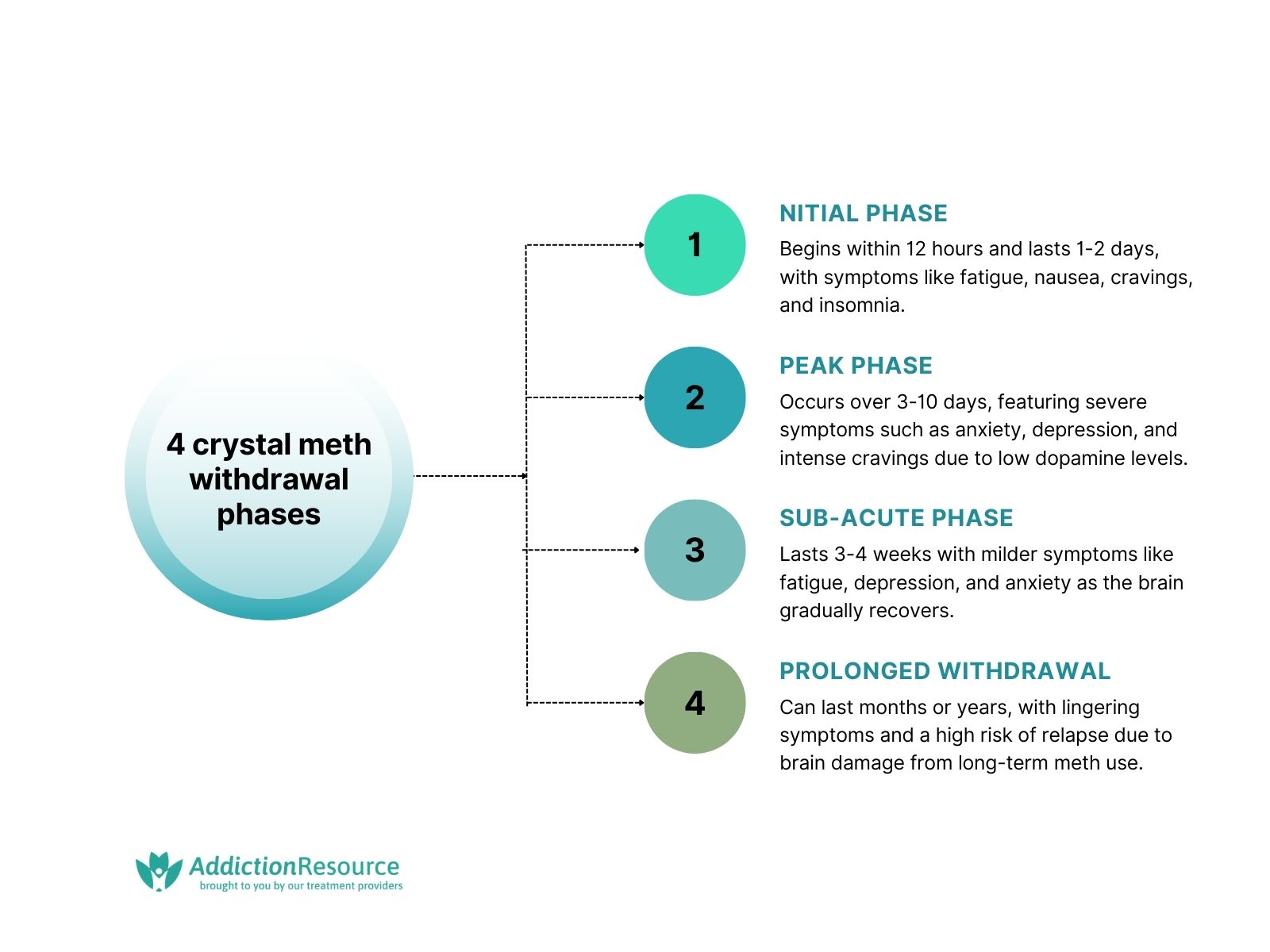
The crystal meth withdrawal timeline includes the initial phase, peak phase, sub-acute phase, and prolonged withdrawal.
The 4 crystal meth withdrawal phases are listed below:
- Initial phase: The initial phase is also called the crash phase as the body quickly responds to change because of crystal meth’s absence. Crystal meth withdrawal symptoms appear within 12 hours and last for almost 24-48 hours after the drug consumption. Withdrawal symptoms are fatigue, nausea, sweating, cravings, insomnia, and increased appetite.
- Peak phase: The peak phase is the second withdrawal phase in which low dopamine levels because of stopping meth use affect the emotions and mood of individuals. The peak phase has severe withdrawal symptoms that last for 3 to 10 days. Withdrawal symptoms in the peak phase are anxiety, depression, paranoia, aches, sleep disturbances, emotional instability, intense cravings, and irritability.
- Sub-acute phase: The brain tries to recover from the side effects of crystal meth and the symptoms are mild in the sub-acute phase. Individuals experience emotional instability because of low dopamine production in the brain. The sub-acute phase lasts for 3 to 4 weeks and the withdrawal symptoms are fatigue, depression, anxiety, and moderate confusion.
- Prolonged withdrawal: The prolonged withdrawal, also known as post-acute withdrawal syndrome (PAWS) occurs when withdrawal symptoms last for a longer duration. Prolonged withdrawal occurs when the brain receptors are damaged because of long-term use of crystal meth. The prolonged withdrawal phase lasts for months or a year and the chances of relapse are high, according to research titled “Identification and Evidence-Based Treatment of Post–Acute Withdrawal Syndrome” published in 2022 by ScienceDirect.
What are the Treatment Options for Crystal Meth Withdrawal?
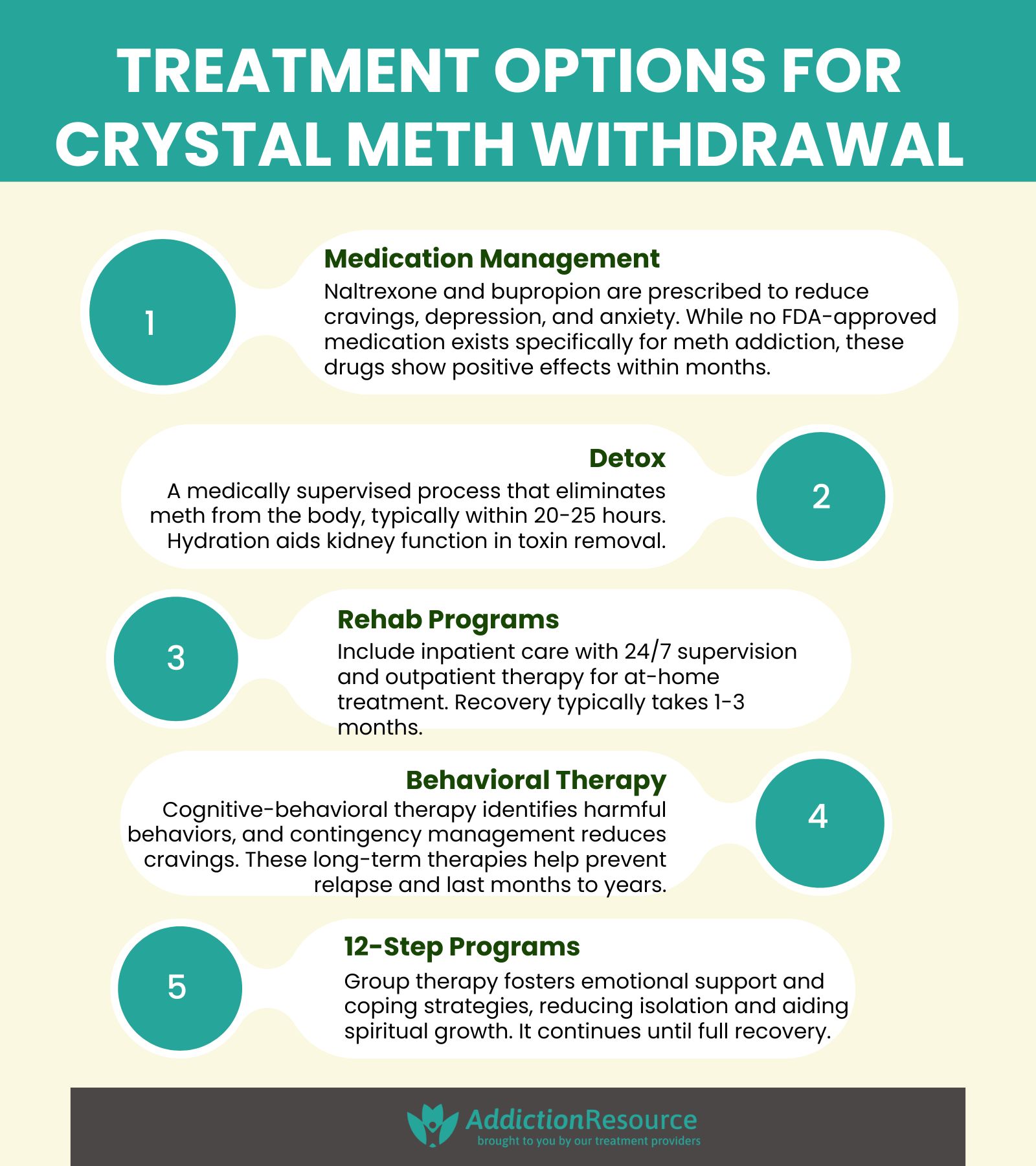
The treatment options for crystal meth withdrawal are medication management, detox, rehab programs, behavioral therapy, and a 12-step program.
The 5 treatment options for crystal meth withdrawal are listed below:
- Medication management: Medications like naltrexone and bupropion are used in OTPs to treat substance use disorders. The FDA does not approve any specific medication for methamphetamine addiction, according to research titled “Bupropion and Naltrexone in Methamphetamine Use Disorder” published in 2021 by the New England Journal of Medicine. Doctors prescribe naltrexone and bupropion which are opioid antagonists to treat crystal meth disorder. Medications help individuals to reduce cravings, depression, and anxiety during treatment. Medicines show positive effects after a few months of consumption.
- Detox: Detox occurs in doctors supervision that helps in eliminating crystal meth from the body. Detox shows effective recovery during the initial phase and peak phase. Detoxification treatments take almost 20 to 25 hours to excrete crystal meth from the body. Doctors keep individuals hydrated which helps the kidneys to eliminate all the toxins from the body through urine.
- Rehab programs: Rehab programs provide inpatient (therapy with 24/7 medical supervision) and outpatient therapy (provide regular therapy while living at home). Rehabilitation centers help individuals to overcome crystal meth withdrawal symptoms in approximately 1 to 3 months.
- Behavioral therapy: Behavioral therapies such as cognitive behavioral therapy and contingency management therapy help doctors to know the cause of addiction and provide treatments without relapse. Cognitive behavioral therapy is effective in identifying harmful behaviors and thoughts. Contingency management therapy helps individuals to cope with crystal meth cravings and is very beneficial. Behavioral therapy is a long-term treatment that lasts for months or years.
- 12-step programs: A 12-step program is a group therapy where individuals share their experiences and support each other. Individuals learn coping strategies during the sessions to minimize drug cravings and it also reduces isolation. 12-step program treatment provides emotional support and helps in spiritual development to overcome addiction. It is a long-term therapy program that lasts till the individual recovers completely.
What are the Coping Strategies for Crystal Meth Withdrawal?
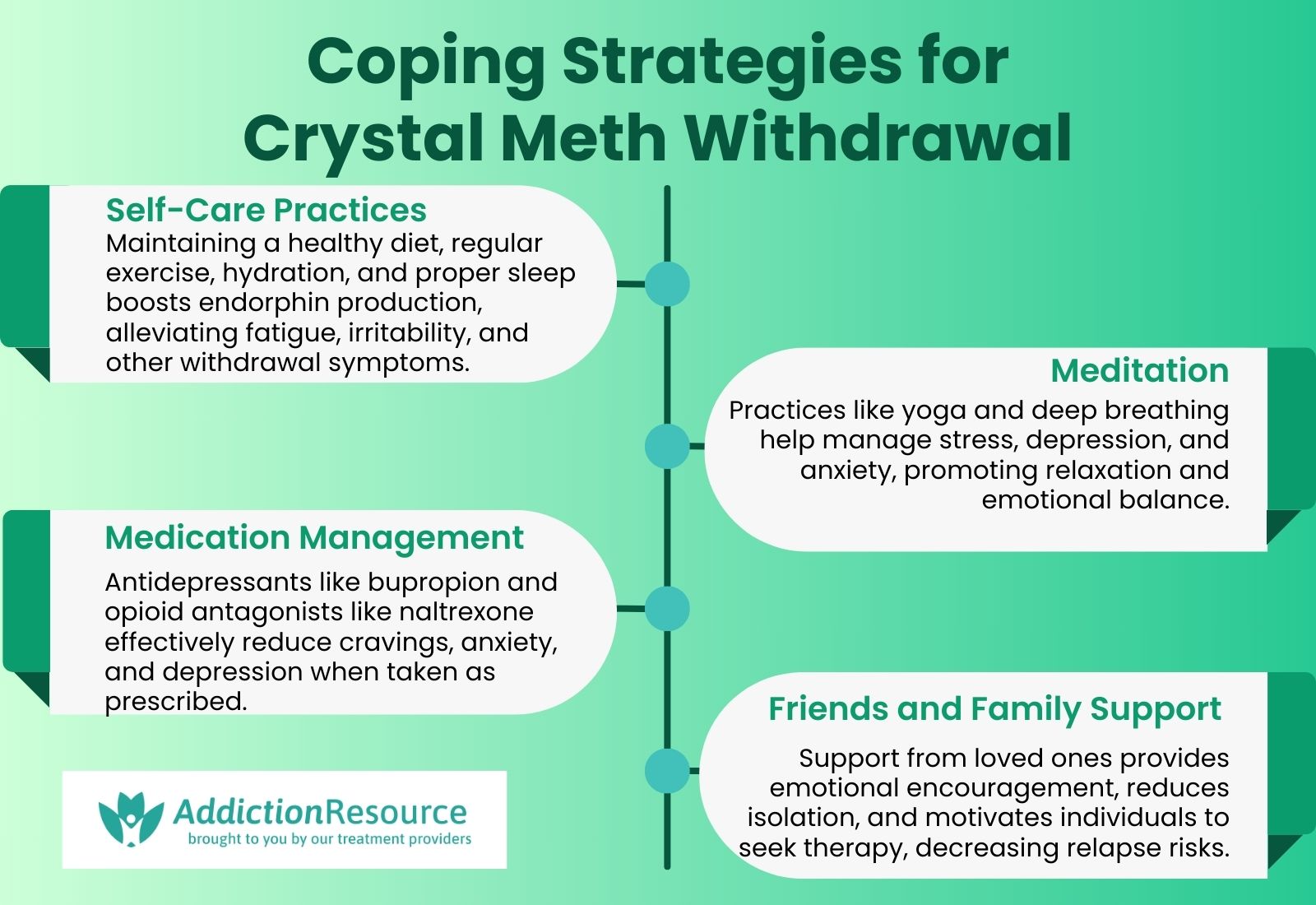
The coping strategies for crystal meth withdrawal are self-care practices, meditation, medication management, and friends or family support.
The 4 coping strategies for crystal meth withdrawal are listed below:
- Self-care practices: Self-care practices such as a healthy diet, proper nutrition, regular exercise, physical activities, staying hydrated, and sleeping properly help individuals recover from addiction without relapsing. Physical exercise and a balanced diet increase the production of endorphin which minimizes the withdrawal symptoms of crystal meth. Balancing the sleep cycle reduces fatigue and irritability in individuals.
- Meditation: Mediation such as yoga or deep breathing plays an important role in relaxing the mind and body which reduces stress, depression, cravings, and anxiety. Individuals feel relaxed and active through meditation because it helps regulate their positive emotions.
- Medication management: Doctors prescribe antidepressant medicine like bupropion to minimize cravings, anxiety, and depression. Naltrexone is an opioid antagonist that helps to reduce substance use disorder. Taking regular medicine through prescription helps to overcome crystal meth withdrawal symptoms.
- Friends and family support: Trusting friends and family is the best coping strategy to recover from meth addiction. Friends and family encourage individuals to get therapies and treatments that reduce feelings of social isolation. Communicating with loved ones about your condition helps to manage withdrawal symptoms and reduces the chances of relapse.
What is Crystal Meth Addiction?
Crystal meth addiction is a result of prolonged use of drugs despite knowing the negative consequences. The repeated use of crystal meth affects the brain functioning and causing organ damage. Crystal meth is an illegal synthetic drug and is classified as a Schedule II substance which means that it has a high potency of physical and psychological dependency. Crystal meth activates the opioid receptors that release huge amounts of neurotransmitters which enhance feelings of pleasure, happiness, alertness and also increase attention span. Individuals find it difficult to achieve these feelings without the drugs which leads to crystal meth addiction.
How to wean off a meth addiction?
Meth addiction is weaned off by seeking professional help to address physical and psychological issues and getting treatments like medications, behavioral therapy, and detoxification. Individuals overcome crystal meth addiction, if they adopt healthy habits like sleeping regularly, eating healthy food, staying hydrated, meditating properly, getting support group therapies, and managing mental health issues. Crystal meth is an addictive drug so quitting under a doctor’s supervision is considered more safe and appropriate.
What drug do they use to wean meth addicts?
Doctors use oral bupropion and naltrexone to wean off meth addiction. Meth is an illegal drug and there is no proper medicine approved by FDA for treating meth addiction, according to research titled “Combination treatment for methamphetamine use disorder shows promise in NIH study” published in 2021 by the National Institute of Health. Bupropion and naltrexone together show effective results in reducing cravings, anxiety, and depression in individuals with methamphetamine use disorder.
Can using crystal meth once cause withdrawal?
No, using crystal meth once cannot cause withdrawal but it leads to come down. Comedone means that individuals experience short-term physical and psychological side effects after crystal meth wears off. Crystal meth withdrawal occurs when individuals stop taking meth after prolonged use. The body is dependent on crystal meth to function normally, so when individuals stop consuming meth that leads to crystal meth withdrawal.
Can you get meth sores during the withdrawal phase?
Yes, individuals get meth sores during the withdrawal phase because of formication which is the feeling of crawling skin due to a drop in dopamine level. Meth sores are open wounds or lesions that appear because of continuous meth use for a long time. The chances of meth sores are high in the withdrawal phase if individuals have a habit of scratching during crystal meth use.
How Severe is Crystal Meth Withdrawal Compared to Other Drugs?
Crystal meth withdrawal symptoms are severe and long-lasting compared to other drugs because of its addictive nature and long recovery time. The psychological withdrawal symptoms are intense in crystal meth compared to other drugs like heroin, cocaine, and methadone because of its long half-life of 12 hours.
Does crystal meth withdrawal lead to more severe fatigue than heroin withdrawal?
Yes, crystal meth leads to more severe and long-lasting fatigue than heroin withdrawal because of its stimulant nature. Individuals try to recover from meth addiction after prolonged use and experience intense fatigue for weeks or months compared to heroin fatigue during the withdrawal phase.
How to quit meth?
To quit meth individuals seek professional help, therapy, treatments, and medication. Methamphetamine is a strong stimulant drug that makes it difficult and dangerous for individuals to quit without medical care. Healthy habits like a nutritious diet, daily exercise, regular sleep, and meditation help individuals to overcome intense cravings for meth use.
How to come down off of meth?
Coming down off of meth is difficult but proper sleep, rest, a pleasant environment, family support, and medication helps individuals to come down off of meth. Crystal meth shows intense psychological and physical side effects after the drug wears off. Individuals experience emotional instability and tiredness in the body because of meth consumption but with proper professional help, they can come down off of meth.
Hope Without Commitment
Find the best treatment options. Call our free and confidential helpline
Most private insurances accepted





